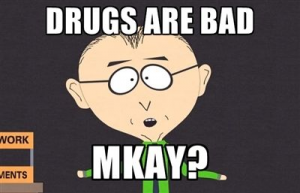Last updated on October 1st, 2016 at 11:35 pm
One of the first question someone new to nootropics asks is “why aren’t nootropics popular? How come I have never heard of them until now?”. There are a myriad of reasons for this.
Table of Contents
Expecting instant results
Probably the most common reason why people dismiss nootropics is because they expect to notice benefits immediately after ingesting a nootropic. While this is true for some nootropics, like caffeine for example, other nootropics typically take weeks to start working. Much like exercise and/or diet, and despite the ease of taking nootropics, most people give up after the first few days or week and don’t give enough time for the nootropic to start working.
Expecting extreme results
 Another common reason as to why nootropics aren’t more popular is because most nootropics are subtle. There is no nootropic that can turn you into a genius, it’s simply not possible yet. It may be possible in the future, but for now we’re stuck with subtle nootropics. Regardless, many nootropics are very subtle in that you only notice their effects in certain situations.
Another common reason as to why nootropics aren’t more popular is because most nootropics are subtle. There is no nootropic that can turn you into a genius, it’s simply not possible yet. It may be possible in the future, but for now we’re stuck with subtle nootropics. Regardless, many nootropics are very subtle in that you only notice their effects in certain situations.
One example of this is taking an exam or test in school and being able to remember details you thought you’d long forgotten. Another example is being able to remain productive for a longer time than usual at work or not feeling fatigued during and after work.
Stigma around powders
 A lot of nootropic vendors sell bulk powders to lower the price of the nootropic and to allow more freedom when dosing. However, this is not all good and well as there is a stigma surrounding powders, especially white powders. Powders are often associated with illicit drugs such as cocaine. Not only that, but powders are seen as dangerous and mysterious. And it doesn’t help that there have been deaths from powdered caffeine.
A lot of nootropic vendors sell bulk powders to lower the price of the nootropic and to allow more freedom when dosing. However, this is not all good and well as there is a stigma surrounding powders, especially white powders. Powders are often associated with illicit drugs such as cocaine. Not only that, but powders are seen as dangerous and mysterious. And it doesn’t help that there have been deaths from powdered caffeine.
Caffeine is extremely safe when dosed properly, but overdosing can cause severe side effects and death. In fact, there have been many deaths because of powdered caffeine.[1][2] Of course it’s not the powder itself, but the improper dosing that caused the users to die. Regardless, ignorant people will attribute the deaths to the powder, and not to the improper dose.
Lack of regulation
Unlike pharmaceutical manufacturers which undergo scrutiny from the FDA and other drug administrations, nootropic vendors are free to do as they please. They can under-dose and add filler to their nootropics, they can allow for a large amount of impurities and no one is going to hold them accountable. Of course, if someone dies after ingesting one of their nootropics word will quickly spread. Luckily, there are no reports of anyone dying after taking nootropics in the proper manner. However, these concerns are justified. There are many supplement companies that deceive their customers by under-dosing their products and adding a filler.[3]
Lack of long-term studies
 Many nootropics have not had long-term clinical trials done on them. Therefore, their long-term safety is not known. They may be beneficial or harmful, but until proper long-term studies are done, no one can say for sure. Most studies only last a month to a few months, not years. Smoking cigarettes regularly for a few months will not significantly increase your risk of lung cancer, but over a few years the risk will increase more and more until it leads to lung cancer.
Many nootropics have not had long-term clinical trials done on them. Therefore, their long-term safety is not known. They may be beneficial or harmful, but until proper long-term studies are done, no one can say for sure. Most studies only last a month to a few months, not years. Smoking cigarettes regularly for a few months will not significantly increase your risk of lung cancer, but over a few years the risk will increase more and more until it leads to lung cancer.
Lack of consistent results
Some nootropics can make you feel like you’re the king of the world for a few days and then nothing. Consistency is a big problem with nootropic use as is tolerance. Over time some nootropics lose their efficacy and it can feel like you’re simply taking a sugar pill. Another problem is what works for one person may not work for another. Caffeine works for a large majority of people whereas nootropics tend to be a hit-and-miss.
Conclusion
While nootropics are slowly gaining popularity, it is unlikely for there to be a sudden huge increase in interest. Nootropics have already been featured in the media, most notably in the film Limitless where the drug NZT-48 gives an immense cognitive boost. And yet most people still have not heard of nootropics. Perhaps if the FDA allows for pharmaceutical companies to market drugs as nootropics there will be a large increase in interest, but for now that seems unlikely to happen.
References
- Carpenter, Murray. “Caffeine Powder Poses Deadly Risks.” Well. The New York Times, 18 May 2015
- Hartenstein, Meena. “Man Dies from Caffeine Overdose, Ingested ‘spoonfuls’ of Powder Equivalent to 70 Cans of Red Bull.” NY Daily News. N.p., 3 Nov. 2010
- Morrell, Alex. “Lawsuits Say Protein Powders Lack Protein, Ripping Off Athletes.” Forbes. Forbes Magazine, 12 Mar. 2015

